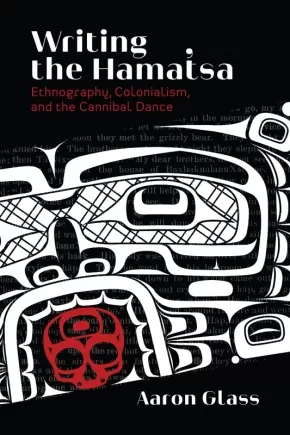Aaron Glass
Aaron Glass is an associate professor at the Bard Graduate Center, New York, coauthor of The Totem Pole: An Intercultural History, and director of the documentary In Search of the Hamatša: A Tale of Headhunting.
Books (1)
Synopsis:
Long known as the Cannibal Dance, the Hamat̓sa is among the most important hereditary prerogatives of the Kwakwa̱ka̱ꞌwakw of British Columbia. Writing the Hamat̓sa offers a critical survey of attempts to record, describe, and interpret the dance under shifting colonial policy. In the late nineteenth century, as anthropologists arrived to document the practice, colonial agents were pursuing its eradication and Kwakwa̱ka̱ꞌwakw were adapting it to ensure its survival. In the process, the dance – with dramatic choreography, magnificent bird masks, and an aura of cannibalism – entered a vast and variegated library of ethnographic texts.
Drawing on close, contextualized reading of published texts, extensive archival research, and fieldwork, Aaron Glass analyses key examples of overlapping genres over four centuries: the exploration journal, the territorial survey, the missionary polemic, settler journalism, government reports, anthropological works (especially by Franz Boas and George Hunt), poetry, fiction, and Indigenous (auto)biography.
Going beyond postcolonial critiques of representation that often ignore Indigenous agency in the ethnographic encounter, Writing the Hamat̓sa focuses on forms of textual mediation and Indigenous response that helped transform the ceremony from a set of specific performances into a generalized cultural icon. This meticulous work illuminates how Indigenous people contribute to, contest, and repurpose texts in the process of fashioning modern identities under settler colonialism.
This comprehensive critical survey of ethnographic literature on the Hamat̓sa ceremony will be an invaluable resource for scholars and students of the Northwest Coast in a range of disciplines – Indigenous studies, anthropology and history of anthropology, ethnohistory, BC studies, art history, museum studies, and material culture – as well as for Kwakwa̱ka̱ꞌwakw/Indigenous readers.
Educator Information
Table of Contents
Foreword / Chief William Cranmer/T̓łlakwagila (ꞌNa̱mg̱is Nation)
Prologue: Points of Arrival and Departure
Introduction: From Writing Culture to the Intercultural History of Ethnography
1 A Complex Cannibal: Colonialism, Modernity and the Hamat̓sa
2 Discursive Cannibals:The Textual Dynamics of Settler Colonialism, 1786–1893
3 The Foundations of All Future Researches: The Work of Franz Boas and George Hunt, 1886–1966
4 Reading, Rewriting, and Writing Against: Changing Anthropological Theory, 1896–1997
5 From Index to Icon: (Auto)Biography and Popular Culture, 1941–2012
6 Reading Culture, Consuming Ethnography
Afterword: Between This World and That / Andy Everson/Tanis (K̕ómoks Nation)
Appendices
Glossary
Notes; References; Index
Additional Information
512 pages | 6.00" x 9.00" | 28 b&w photos, 2 maps | Paperback






